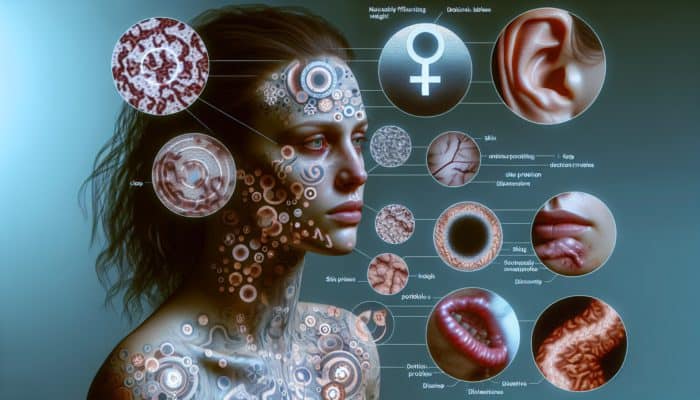Enhancing Health and Wellness through Understanding Hormonal Imbalances
What Are Hormonal Imbalances and How Do They Impact Your Body's Functionality?

Hormonal imbalances are crucial medical issues that arise when there is either an excessive or insufficient concentration of particular hormones in the bloodstream. This imbalance can lead to a myriad of health complications that profoundly affect overall well-being. The symptoms can vary widely and are contingent upon which hormones are disrupted. Commonly reported signs include:
- Persistent fatigue or significant drops in energy levels
- Unexplained weight gain or loss that seems disproportionate to lifestyle changes
- Marked alterations in mood, including heightened anxiety or depressive episodes
- Irregular menstrual cycles for women, affecting reproductive health
- Sleep disturbances that hinder daily activities and productivity
- Skin issues like acne outbreaks or excessive dryness
- A noticeable decrease in libido or sexual desire
- Digestive problems that disrupt normal bodily functions
These symptoms highlight the critical balance that hormones maintain within the body, influencing essential functions ranging from growth and mood to metabolism. If these imbalances remain unrecognised and unmanaged, they can escalate into chronic health conditions, significantly diminishing an individual's quality of life.
What Are the Primary Causes Contributing to Hormonal Imbalances?
Understanding the various contributors to hormonal imbalances is vital for effective management and treatment. One of the most significant disruptors is stress, which can cause elevated cortisol levels that interfere with the regulation of other hormones. In addition, dietary choices play an integral role; a diet high in processed foods, sugars, and unhealthy fats can exacerbate hormonal issues and lead to detrimental health outcomes.
Lifestyle choices also have a profound influence on hormonal health. A lack of physical activity can result in weight gain, which can further disrupt hormone levels. Environmental factors, such as exposure to endocrine disruptors found in certain plastics and personal care products, may complicate hormonal health as well. By identifying these underlying causes, individuals can initiate proactive lifestyle changes that help mitigate imbalances and foster enhanced overall wellness.
How Do Hormonal Imbalances Affect Overall Health and Well-being?
The impacts of hormonal imbalances extend far beyond mere discomfort; they can significantly disrupt various bodily functions and systems. For instance, imbalances in insulin can lead to metabolic syndrome and diabetes, while disruptions in thyroid hormones can impede energy levels and metabolic processes. Furthermore, the regulation of mood may be compromised, resulting in a heightened prevalence of anxiety or depression.
Moreover, if hormonal imbalances remain unaddressed, long-term repercussions for overall health can ensue. Chronic stress and its resulting hormonal fluctuations may contribute to severe cardiovascular issues. Similarly, women’s reproductive health may be adversely affected, increasing the likelihood of conditions such as polycystic ovary syndrome (PCOS). Thus, comprehending the extensive effects of hormonal imbalances is crucial for proactive health management and the promotion of long-term wellness.
What Diagnostic Methods Are Available to Identify Hormonal Imbalances?

Diagnosing hormonal imbalances typically involves a variety of testing methods, including blood and saliva tests that accurately evaluate hormone levels. These assessments can effectively detect discrepancies and pinpoint specific imbalances that may be impacting an individual’s health. Early detection is essential, as it allows for timely interventions that can prevent the escalation of more serious health issues down the line.
Consultation with healthcare professionals during this diagnostic phase is paramount. They can accurately interpret test results and provide guidance on the necessary subsequent steps to restore hormonal balance. Regular check-ups are crucial for monitoring hormonal health over time, ensuring that any emerging issues are promptly identified and effectively addressed.
What Treatment Options Are Available to Restore Hormonal Balance?
Treatment options for hormonal imbalances can be multifaceted, often requiring a combination of hormone therapy, lifestyle modifications, and dietary adjustments. Hormone therapy may be prescribed when deemed necessary, especially in cases of significant imbalances that severely impact quality of life. However, it is equally important to collaborate with healthcare professionals to formulate a personalised approach that considers individual health needs and preferences.
Natural lifestyle changes, such as introducing regular exercise, effective stress management techniques, and improved sleep hygiene, can greatly enhance hormonal balance. Dietary adjustments, particularly the incorporation of nutrient-dense foods while reducing sugar intake, can also significantly influence hormonal health. Working with a healthcare provider can help create an effective, personalised treatment plan that addresses individual needs and fosters sustainable long-term health outcomes.
Top Expert Recommendations for Effectively Managing Hormonal Imbalances
What Are the Most Effective Strategies for Sustaining Hormonal Balance?

Experts endorse a diverse range of techniques to effectively manage hormonal imbalances. These strategies can encompass dietary modifications, consistent physical activity, and stress management practices, all thoughtfully tailored to suit individual lifestyles. For example, individuals facing weight-related hormonal challenges may derive substantial benefits from adopting a Mediterranean diet, which is abundant in omega-3 fatty acids, whole grains, and lean proteins.
Real-world examples highlight the success of these strategies. For instance, a group of women experiencing PMS symptoms reported notable improvements after integrating yoga and mindfulness practices into their routines. This not only alleviated their symptoms but also enhanced their overall emotional well-being. Additionally, case studies indicate that individuals who incorporate strength training into their weekly routines often report elevated mood and energy levels, illustrating the profound impact that exercise can have on hormonal health.
How Can Lifestyle Modifications Promote Hormonal Balance?
Implementing lifestyle changes can significantly transform the journey toward achieving hormonal balance. Establishing consistent sleep patterns is a key strategy; quality sleep is vital for sustaining hormonal equilibrium. Aim for 7-9 hours of uninterrupted sleep each night, and establish a calming bedtime routine to enhance sleep quality.
Balanced nutrition is another critical aspect of maintaining hormonal health. Integrating whole, unprocessed foods into your diet can effectively aid in regulating hormones. Here are some actionable steps for implementing these dietary changes:
- Prioritise whole foods such as fruits, vegetables, whole grains, and lean proteins.
- Minimise the intake of sugars and processed foods, which can induce insulin spikes.
- Stay properly hydrated to support metabolic processes.
- Engage in regular physical activity to foster healthy hormone production.
- Practice mindfulness or meditation to manage stress effectively.
These lifestyle changes can significantly enhance hormonal balance, leading to improved health outcomes and an enriched quality of life.
What Is the Importance of Professional Guidance in Managing Hormonal Health?
Seeking professional guidance is vital when addressing hormonal imbalances. Healthcare professionals provide personalised strategies and ongoing support tailored to individual needs and circumstances. They can conduct necessary tests to identify specific hormonal issues and recommend appropriate treatments or interventions based on the results.
Moreover, healthcare professionals can assist in developing comprehensive lifestyle plans that integrate nutrition, exercise, and stress management techniques. Engaging with experts ensures that individuals are equipped with the knowledge to make informed decisions regarding their health, ultimately leading to more effective management of hormonal imbalances. Regular consultations with healthcare providers facilitate ongoing adjustments to strategies, ensuring continued success in achieving hormonal balance.
What Are the Notable Benefits of Successfully Managing Hormonal Imbalances?
Significant Health Improvements Through Effective Hormonal Management
Addressing hormonal imbalances can result in substantial improvements in overall health and well-being. By restoring balance, individuals can significantly lower the risk of developing chronic diseases such as diabetes, heart disease, and certain cancers. Furthermore, managing hormonal health can enhance quality of life by alleviating discomfort and fostering better functioning of bodily systems.
For instance, individuals who successfully address thyroid imbalances often report increases in energy levels, improved mood, and a greater capacity to engage in daily activities. Ultimately, the advantages of effectively managing hormonal imbalances extend beyond mere symptom relief, laying a robust foundation for long-term health and vitality.
How Does Hormonal Balance Contribute to Improved Mental Well-being?
Achieving hormonal balance can significantly enhance mental well-being. Many individuals notice marked improvements in mood and cognitive function once hormonal imbalances are effectively managed. For example, women suffering from premenstrual syndrome (PMS) frequently find that their emotional symptoms diminish with appropriate hormonal management, resulting in better overall mental health.
Additionally, balanced hormones can positively influence neurotransmitter function, fostering better emotional regulation. Techniques such as regular exercise and mindfulness practices can further support this process, creating a synergistic effect that enhances mental clarity and emotional stability. By prioritising hormonal health, individuals can pave the way for improved mental well-being and resilience in their daily lives.
What Is the Connection Between Hormonal Balance and Physical Appearance?
Hormonal balance plays a pivotal role in shaping physical appearance. Fluctuations in hormones can affect skin health, hair growth, and weight management. For instance, achieving hormonal balance can result in clearer skin and improved hair health, as hormonal fluctuations often contribute to issues such as acne or hair thinning.
Moreover, maintaining hormonal equilibrium can assist in regulating body weight. When hormones are balanced, metabolism operates at its best, facilitating weight loss or maintenance. This, in turn, can significantly influence self-confidence and self-image. Individuals who successfully manage hormonal imbalances frequently report not only improvements in their physical appearance but also heightened self-esteem and body positivity.
How Can Correcting Hormonal Imbalances Elevate Energy Levels?
Correcting hormonal imbalances can lead to remarkable increases in energy levels. Many individuals facing hormonal issues report chronic fatigue, which can severely diminish their quality of life. By addressing these imbalances, individuals can experience heightened vitality and reduced feelings of tiredness.
Incorporating regular physical activity, maintaining a balanced diet, and ensuring sufficient sleep all contribute to improved hormonal health and energy levels. For instance, individuals who include strength training in their exercise routines often find they enjoy greater stamina throughout the day. The interplay between exercise and hormonal regulation is crucial, as physical activity stimulates hormone production that enhances energy and mood. Ultimately, restoring hormonal balance can invigorate daily performance and productivity, enabling individuals to thrive both personally and professionally.
Effective Strategies for Achieving Hormonal Balance
What Dietary Approaches Support Optimal Hormonal Balance?
Certain dietary strategies can have a pronounced influence on maintaining hormonal balance. Incorporating foods rich in healthy fats, such as avocados, nuts, and oily fish, can support hormone production and regulation. Additionally, foods high in fibre can assist in managing insulin levels, which is particularly crucial for those experiencing hormonal imbalances related to blood sugar regulation.
Expert analyses suggest that including cruciferous vegetables, such as broccoli and Brussels sprouts, can help detoxify excess hormones, particularly estrogen. Furthermore, antioxidants found in vibrant fruits and vegetables can combat oxidative stress, which may contribute to hormonal disruptions. Here are some of the best foods to promote hormonal health:
- Leafy greens such as spinach and kale
- Fatty fish like salmon and mackerel
- Fermented foods, including yogurt and sauerkraut
- Nuts and seeds, particularly flaxseeds and walnuts
- Whole grains like quinoa and brown rice
By adopting these dietary strategies, individuals can establish a nutritional foundation that supports hormonal balance and enhances overall health outcomes.
How Does Regular Exercise Promote Hormonal Health?
Engaging in regular physical activity is crucial for maintaining hormonal health. Different forms of exercise can yield varying effects on hormonal balance, making it essential to find an exercise routine that aligns with individual preferences and needs. For instance, aerobic exercises such as running or cycling can improve insulin sensitivity and facilitate weight loss, while resistance training can lead to increases in testosterone levels and muscle mass.
Moreover, incorporating high-intensity interval training (HIIT) can significantly boost metabolic rate and hormonal function. Individuals who engage in regular physical activity often report enhancements in mood, energy levels, and overall health. Tailoring an exercise regimen to incorporate a mix of cardiovascular, strength, and flexibility training can yield optimal results in effectively regulating hormonal balance.
How Can Stress Management Techniques Enhance Hormonal Balance?
Utilising stress management techniques, including practices such as meditation and yoga, can significantly aid in achieving hormonal balance. Chronic stress elevates cortisol levels, which can disrupt the delicate interplay of other hormones within the body. By implementing stress-reducing practices, individuals can lower cortisol levels and promote hormonal balance.
Meditation fosters mindfulness and can lead to profound changes in the body’s stress response. Yoga, on the other hand, combines physical movement with breathing techniques, enhancing overall well-being. Regularly practising stress management strategies can lead to improved hormonal regulation, fostering resilience and better health outcomes for individuals.
What Is the Significance of Sleep Patterns in Hormonal Regulation?
Quality sleep is paramount for maintaining hormonal balance. When individuals experience sleep disturbances, it can disrupt the production and regulation of key hormones, including cortisol and insulin. Establishing a consistent sleep routine is critical; going to bed and waking up at the same time each day helps regulate the body's natural circadian rhythms and promotes restorative sleep.
Enhancing sleep quality can also be achieved by creating a restful environment, minimising screen time before bed, and avoiding stimulants such as caffeine in the evening. Individuals who prioritise sleep often report improvements in mood, energy levels, and overall health, underscoring the significant impact of adequate sleep on hormonal regulation.
What Role Do Supplements Play in Supporting Hormonal Health?
Certain supplements can play a supportive role in maintaining hormonal balance. For instance, omega-3 fatty acids can reduce inflammation and support overall hormonal health, while magnesium can effectively regulate cortisol levels. Additionally, vitamin D is crucial for hormonal regulation, particularly for individuals who may be deficient in this essential nutrient.
When considering supplements, it is vital to choose those that are backed by research and to seek guidance from healthcare providers. They can recommend appropriate dosages and ensure that supplements complement individual health needs. By incorporating the right supplements into a holistic approach to health, individuals can bolster their efforts in achieving hormonal balance more effectively.
How Does the Process of Addressing Hormonal Imbalances Function?
What Are the Mechanisms Behind Hormonal Regulation?
The body employs intricate feedback loops to maintain hormonal balance. These feedback mechanisms ensure that when hormone levels rise or fall, the body responds appropriately to restore equilibrium. For example, when blood sugar levels increase, insulin is secreted to help lower those levels, showcasing the body's remarkable ability to self-regulate.
Grasping these mechanisms is crucial for devising effective strategies for managing hormonal imbalances. By understanding how hormones interact and influence one another, individuals can implement targeted interventions that address specific imbalances. This knowledge empowers individuals to take charge of their hormonal health, leading to more successful management strategies and improved overall well-being.
How Do Supplements Assist in Achieving Hormonal Balance?
Supplements can provide invaluable support in achieving hormonal balance, but it is essential to approach their use wisely. Certain supplements can help fill nutritional gaps and provide the body with the nutrients it requires for optimal hormone production. For instance, adaptogenic herbs such as ashwagandha may assist the body in adapting to stress and effectively supporting adrenal health.
However, it is vital to consult with healthcare professionals before introducing supplements into your routine. Professional guidance ensures that individuals select the right supplements that align with their health goals and needs. By integrating supplements thoughtfully into a broader health strategy, individuals can enhance their efforts in achieving hormonal balance successfully.
What Is the Difference Between Short-Term and Long-Term Solutions for Hormonal Imbalances?
Some strategies for managing hormonal imbalances provide immediate relief, while others focus on long-term health outcomes. Short-term solutions, such as medication or temporary dietary changes, may yield quick results but may not sufficiently address underlying issues. In contrast, long-term strategies involve lifestyle modifications—such as consistent exercise and a balanced diet—that promote sustainable hormonal health and overall wellness.
Finding the right balance between these approaches is crucial for effective management. By employing both immediate and long-term strategies, individuals can achieve not only symptom relief but also lasting hormonal balance that supports overall health and well-being.
How to Monitor and Adjust Your Hormonal Balance Strategies?
Why Is Regular Monitoring of Hormonal Health Essential?
Regular monitoring is essential for assessing hormonal health and adjusting strategies as needed. Ongoing check-ups with healthcare professionals can help track changes in hormone levels and overall health status, allowing for timely adjustments to treatment plans. This proactive approach ensures that individuals remain aligned with their health goals and can make informed decisions regarding their hormonal health.
Monitoring can take many forms, from blood tests to self-assessments of symptoms. Keeping a health journal to track mood, energy levels, and dietary habits can provide valuable insights into the effectiveness of implemented strategies. By staying attuned to changes in their bodies, individuals can make informed decisions regarding their hormonal health and overall wellness.
What Are the Signs Indicating Improvement in Hormonal Health?
Signs of improvement in hormonal health can manifest in various ways. Individuals often report enhanced energy levels, improved mood stability, and an overall sense of well-being as they successfully manage their hormonal imbalances. Physical changes may also become evident, including weight stabilization, clearer skin, and enhanced sleep quality.
Recognising these signs can guide further adjustments to strategies, reinforcing positive behaviours that contribute to hormonal balance. By paying attention to these indicators, individuals can remain motivated in their journey towards optimal hormonal health and maintain their commitment to achieving lasting improvements.
How to Adapt Hormonal Balance Strategies Over Time?
As the body undergoes changes throughout life—due to factors such as age, stress, and lifestyle—strategies for achieving hormonal balance may require adaptations. Flexibility is key to long-term success. Individuals should regularly reassess their approaches to account for changes in their health status and hormonal needs.
Staying informed about the latest research and emerging trends in hormonal health can also facilitate the adaptation of strategies. Engaging with healthcare professionals ensures that individuals receive guidance tailored to their evolving needs. By remaining open to change, individuals can continue to thrive in their pursuit of hormonal balance and overall well-being.
When Is It Necessary to Consult a Healthcare Professional?
Consulting a healthcare professional is crucial when symptoms persist, worsen, or new symptoms arise. Professional guidance ensures that individuals receive proper management of hormonal imbalances and can help rule out underlying health issues that may require further attention or intervention.
Regular communication with healthcare providers can also facilitate timely interventions, ensuring that individuals stay on track in their journey towards hormonal balance. By recognising when to seek help, individuals can protect their health and optimise their overall well-being effectively.
What Roles Do Diet and Exercise Play in Maintaining Hormonal Balance?
Diet and exercise serve pivotal roles in sustaining hormonal balance. A balanced diet rich in whole foods supports hormone production and regulation, while regular physical activity enhances metabolic function and promotes overall health and vitality.
Adjusting dietary choices and incorporating regular exercise can significantly enhance the effectiveness of hormonal balance strategies. For instance, individuals may find that reducing sugar intake leads to improved insulin sensitivity, while engaging in strength training can positively affect testosterone levels. By prioritising both diet and exercise, individuals can create a comprehensive approach to achieving hormonal balance and enhancing overall health outcomes.
Frequently Asked Questions About Hormonal Imbalances
What are the common symptoms of hormonal imbalances?
Common symptoms of hormonal imbalances include fatigue, weight changes, mood swings, irregular menstrual cycles, sleep disturbances, skin issues, low libido, and digestive problems.
What causes hormonal imbalances?
The causes of hormonal imbalances can include stress, poor diet, lack of exercise, environmental factors, and certain medical conditions, all of which can disrupt hormonal equilibrium.
How can I diagnose a hormonal imbalance?
Diagnosing a hormonal imbalance typically involves blood or saliva tests that measure hormone levels and identify any discrepancies that may exist.
What are the treatment options for hormonal imbalances?
Treatment options for hormonal imbalances may include hormone therapy, lifestyle modifications, dietary adjustments, and collaborating with healthcare professionals for tailored approaches.
How do lifestyle changes impact hormonal balance?
Lifestyle changes such as improved sleep, balanced nutrition, and regular exercise can significantly enhance hormonal balance and overall health outcomes.
Are there natural supplements for hormonal balance?
Yes, certain supplements such as omega-3 fatty acids, <a href=”https://amitys.co.uk/benefits-of-aloe-vera-for-hair-health-natural-solutions/”>magnesium</a>, and vitamin D can support hormonal health; however, it's important to consult a healthcare provider for personalised recommendations.
How does stress affect hormonal health?
Chronic stress elevates cortisol levels, which can disrupt the balance of other hormones, leading to various health issues and complications.
What is the link between sleep and hormonal balance?
Quality sleep is essential for hormonal regulation; disturbances in sleep can lead to hormonal imbalances that affect mood, energy, and metabolic function.
How often should I monitor my hormonal health?
Regular check-ups with healthcare professionals are recommended, especially if you are managing hormonal imbalances or experiencing persistent symptoms that require attention.
When should I consult a healthcare professional?
You should consult a healthcare professional if symptoms persist, worsen, or if new symptoms arise, to ensure proper management of hormonal health and overall well-being.
Connect with us on Facebook!
The Article: Channeling Hormonal Imbalance Fixes: Universal Strategies appeared first on Amitys Hair Salon.
The Article Hormonal Imbalance Fixes: Effective Universal Strategies Was Found On https://limitsofstrategy.com

